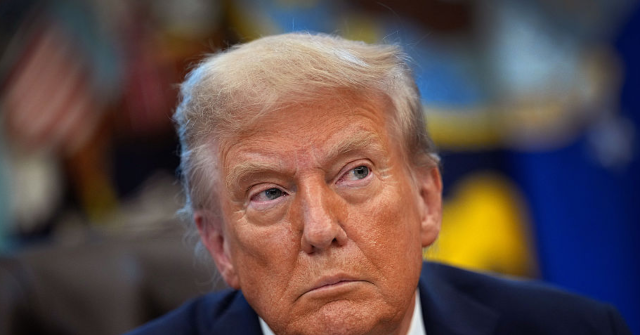President Donald Trump is telling foreign companies to obey U.S. migration laws while also suggesting he may adjust border rules to help law-abiding foreign companies quickly set up operations in the United States.
“I am hereby calling on all Foreign Companies investing in the United States to please respect our Nation’s Immigration Laws,” Trump said via his TruthSocial site.
“We encourage you to LEGALLY bring your very smart people, with great technical talent, to build World Class products, and we will make it quickly and legally possible for you to do so,” said.
The statement comes as nationals in South Korea declared their outrage that U.S. officials detained roughly 300 South Korean workers who were helping to build a car-battery factory in Georgia. These illegal workers are all facing deportation.
Two Korean companies — Hyundai Motor Group and LG Energy Solution Ltd. — had quietly and illegally imported hundreds of Korean workers to build the taxpayer-funded factory.
Current visa rules allow companies to get L-1 visas for their foreign employees to help set up factories and production lines in the United States. However, the Korean companies reportedly used B-1/B-2 visitor visas or special waivers for visitors, which do not allow the travelers to work in jobs.
White-collar advocates in pro-migration groups and allied media are using Korean anger over this workplace raid to demand a greater inflow of foreign workers into jobs that would otherwise go to blue-collar Americans.
Trump is zig-zagging amid the competing pressure from voters and outspoken employers. “We should help them along, and let some people come in to train our people to do complex things, whether it’s battery, computer manufacturing, building chips,” Trump told reporters. “We’re gonna look at that whole situation.”
The companies also used hundreds of South American migrants to help build the factory, which is slated to get $2 billion in tax breaks. The illegal hiring was conducted via staffing companies to shield the Korean companies from prosecution. CNN reported:
Santiago [an illegal migrant from Colombia] estimates that between 70 and 80% of the plant’s workers were South Korean. “They were in charge of doing everything. Communication was 70% in Korean, 20% in English, and 10% in Spanish,” he noted. He also claims that many of the plans and instructions were in Korean, which could make communication difficult. Mauricio said that “it was always a mystery” to know why there were so many Koreans at the plant.
Many of the Koreans at the site are construction workers or skilled technicians, James Rim, president of the Korean-American Association of Southeast Georgia, says. “We just want to make sure their situation is handled legally and that they are respected,” he told CNN.
Large numbers of Koreans have moved into the Georgia district, the New York Times reported on September 6: “Outside the complex, two-lane country roads now have five lanes jammed with traffic. Twenty-minute commutes now sometimes approach an hour, some residents said.”
“Yes, it’s one of those things that has always been technically illegal but virtually never enforced; at least until this admin,” complained Aaron Reichlin-Melnick, an advocate at the American Immigration Council. The Koreans were likely “doing some management of the construction … [but] definitely not taking an American job,” said the immigration lawyer.
Hyundai is a repeat offender. In 2022, Reuters reported:
At least four major suppliers of Hyundai Motor Co and sister Kia Corp have employed child labor at Alabama factories in recent years, a Reuters investigation found, and state and federal agencies are probing whether kids have worked at as many as a half dozen additional manufacturers throughout the automakers’ supply chain in the southern U.S. state.
At a plant owned by Hwashin America Corp, a supplier to the two car brands in the south Alabama town of Greenville, a 14-year-old Guatemalan girl worked this May assembling auto body components, according to interviews with her father and law enforcement officials. At plants owned by Korean auto-parts maker Ajin Industrial Co, in the east Alabama town of Cusseta, a former production engineer told Reuters he worked with at least 10 minors. And six other ex-employees of Ajin said they, too, worked alongside multiple underage laborers.
Korean government officials lobbied Congress in 2024 for a new type of visa to help Korean companies move more of their workforce into U.S. jobs.
Workers in Korea — including a growing number of illegals — are required to work long hours for low wages. This year, the government pushed a plan to enable company executives to force employees to work up to 69 hours per week.
The work pressure has made it very difficult for Koreans to get married and have children. The result is a record low number of new births, ensuring massive future shortfalls in the national labor supply that likely will be filled by more migrants.
The willingness of Korean companies to hire illegals for U.S. jobs ensures that fewer Americans get hired or trained. The New York Times wrote:
Barry Zeigler, the business manager of UA Local Union 188, which represents plumbers, pipe-fitters, welders and air-conditioning technicians, expressed outrage over his members not being given more work at the site. He said that 65 of them had been let go from the battery plant several months ago after being hired to install steel piping.
Administration officials are promising more sweeps in U.S. worksites and in the expanding archipelago of Indian, Chinese, Mexican, Sikh, and Korean economic enclaves throughout the United States.
“Look, no one hires an illegal alien out of the goodness of their heart,” deportation czar Tom Homan told CNN on September 7. “They hire them because they can work them harder, pay them less, and undercut the competition that hires U.S. citizen employees.”
Read the full article here
